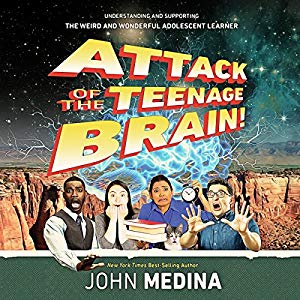John Medina, developmental molecular biologist and New York Times best-selling author, has written a book about how to parent and teach teenagers in light of what we know about adolescent social, cognitive, and neural development. In Attack of the Teenage Brain!: Understanding and Supporting the Weird and Wonderful Adolescent Learner, Medina emphasizes that designing better high schools will require us to consider the development of executive functioning skills during adolescence.
Paradoxically, while elementary schools and schools of higher education in the U.S. are exceptionally strong, our high schools have mediocre performance by international standards. Investing in executive functioning, or the skills that help us effectively and cooperatively get things done, may offer our best opportunity for improving U.S. high schools, Medina argues. Countries whose high schools perform better than ours, also have adolescents with stronger abilities to self-regulate, switch perspective, and temporarily store and manipulate information—the three core components of executive functioning. Medina reviews research by Walter Mischel (reviewed here by Learning and The Brain previously) that shows that the ability to delay gratification, a component of executive functioning, can predict many aspects of children’s future personal, academic, and career success.
To understand how to capitalize on adolescents’ executive functioning skills, it is helpful to understand how the brain changes during adolescence. Using clear, vivid, and accessible analogies, Medina explains several aspects of adolescent neural development that have implications for how we teach them. For example, adolescents’ limbic areas—areas responsible for many of our emotional responses—reach mature levels before the prefrontal cortex, an area responsible for decision-making, planning, and inhibition. This mismatching maturational profile partially explains why adolescence is a time of great vulnerability, why adolescents are more drawn to rewards than deterred by adverse consequences, why they are sensitive to peer influence, and why rational decision-making is still a work-in-progress during adolescence.
In light of these developmental vulnerabilities of adolescence, how could we design better schools for teenagers? The answer begins with factors outside of school. Feelings of safety and strong adult relationships are critical for learning. Indeed, adolescents in homes that feel safe have stronger executive functioning abilities. Using a parenting style (or teaching style) that both sets high expectations of children and provides large amounts of emotional responsiveness and love benefits students’ executive functioning greatly, and thus also their performance in school. Similarly, modeling adult relationships (e.g., between two parents) where conflicts can be resolved using calm and honest communication can offer these same benefits.
Exceptional teachers can buffer against the effects of unstable relationships at home, but there is no substitute for good parenting. To help parents employ an ideal parenting style and model a healthy conflict resolution style, schools should provide night classes to parents to help them learn to create more stable relationships at home. A complementary change would be for high schools to require social-emotional learning initiatives that include a sequenced progression through skills, active application of skills, and a focus on a few critical social skills (e.g., empathy). These programs have been linked to students doing better in school and enjoying it more.
Age fourteen is the peak onset of mental health disorders. High schools should be designed to help navigate the mental health challenges that arise during adolescence. For example, while fewer than 20% of teenagers spend more than 20 minutes a day in physical activity, exercise has been linked to cognitive skill, academic performance, and cerebrovascular density in key brain areas. Most importantly, exercise is about as helpful as antidepressants in treating depression. Medina argues that a gym should be the center piece of a school and sitting time should be replaced with walking time.
Starting school later in the morning to align with the natural shift in sleep patterns that occur during adolescence could help improve mental health and academic performance, and actually save districts money in the long run. Electronic and social media use, and especially the stimulation of electronic multi-tasking, may be contributing to high rates of anxiety in adolescence. Mindfulness exercise can be an antidote, helping to regulate emotions and mood, improve focus, and reduce pain. Medina calls for the integration of mindfulness practices into schools and the creation of mindfulness rooms.
As exemplified throughout this book, Medina makes an argument likely to resonate with Learning and the Brain readers—cognitive neuroscience and education typically are studied separately from one another, but to support adolescents’ success and development, we need to consider multiple forms of development together. Indeed the neuropsychologically derived principles that Medina suggests are likely to improve adolescents’ learning and well-being. Parents, teachers, and school administrators would do well to head his advice.
Medina, J. (2018). Attack of the Teenage Brain!: Understanding and Supporting the Weird and Wonderful Adolescent Learner. Alexandria, VA: ASCD.








